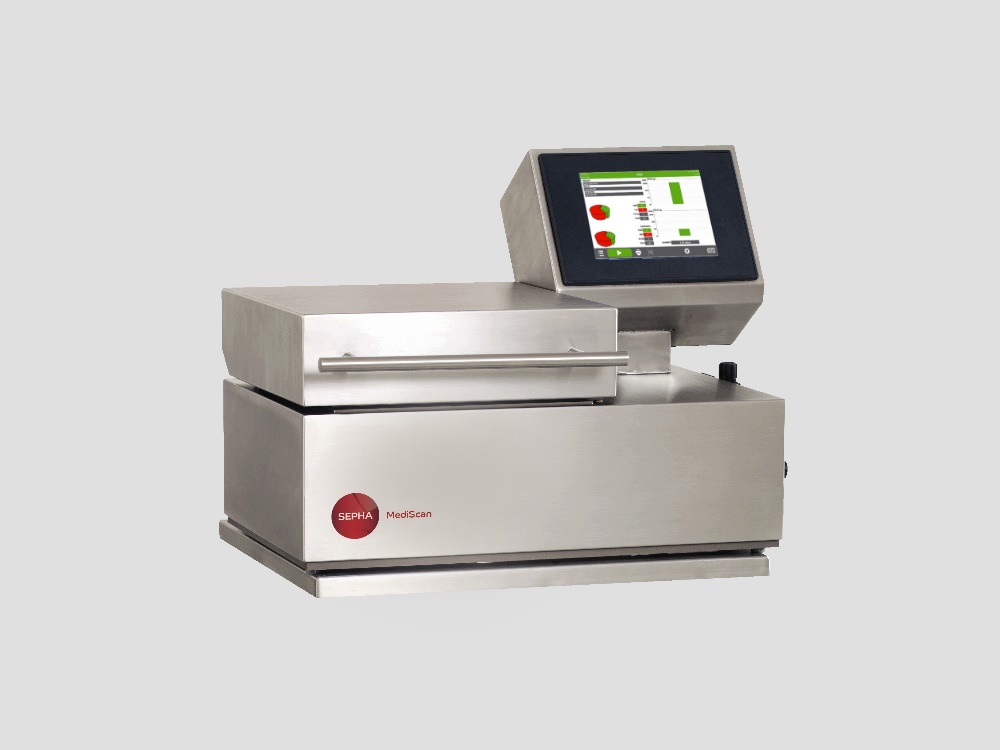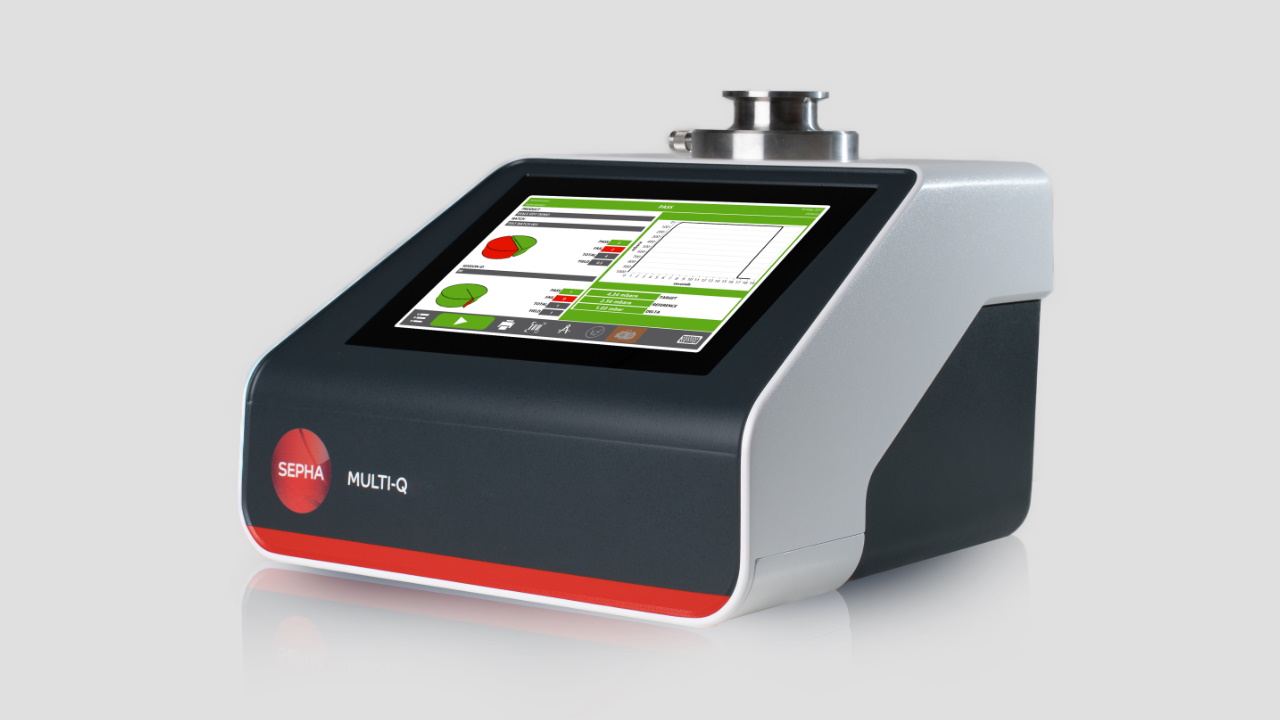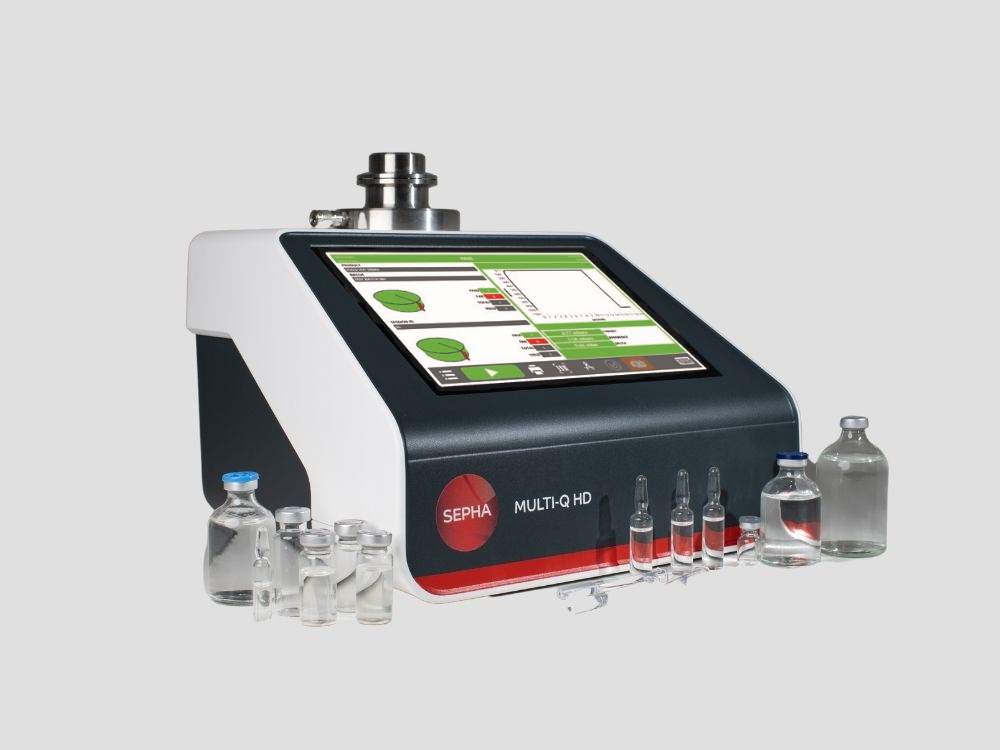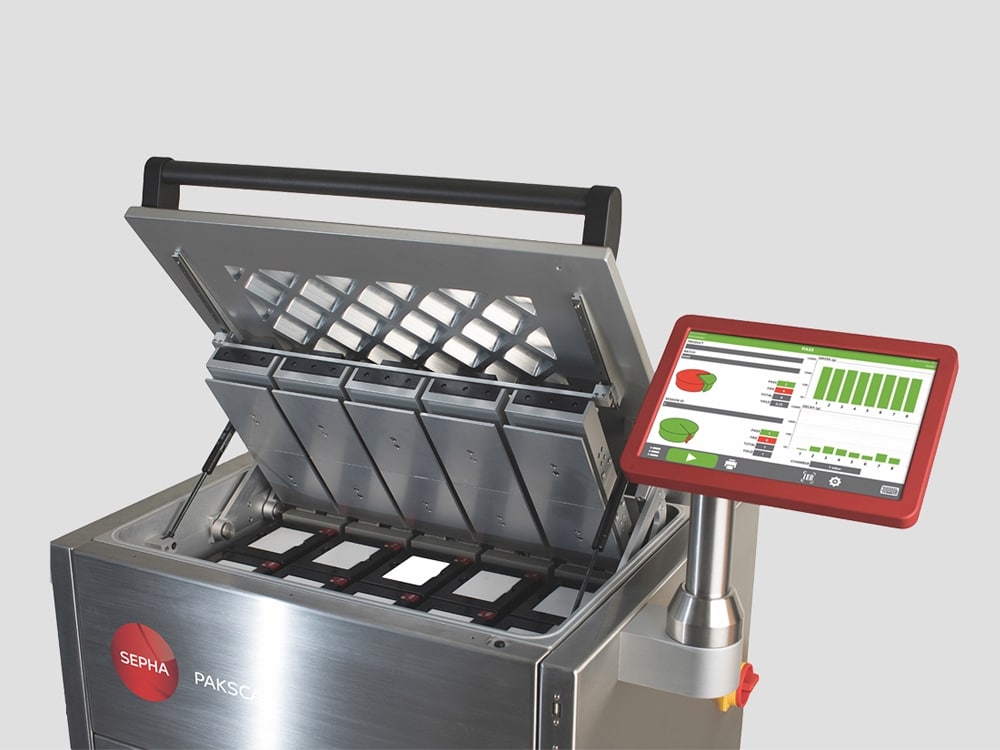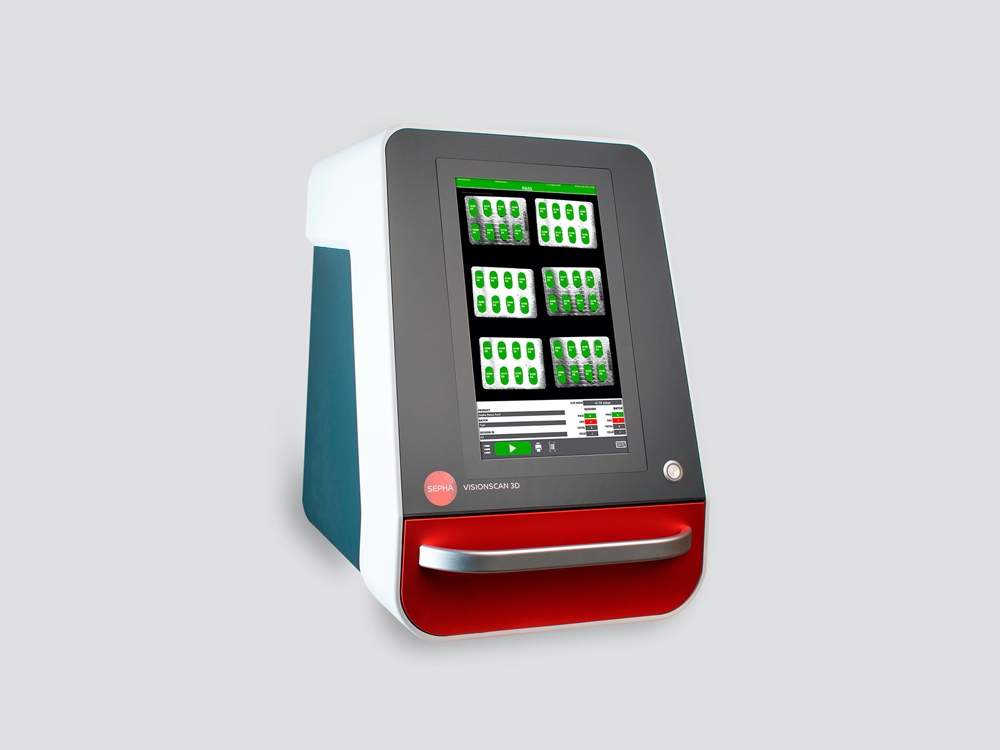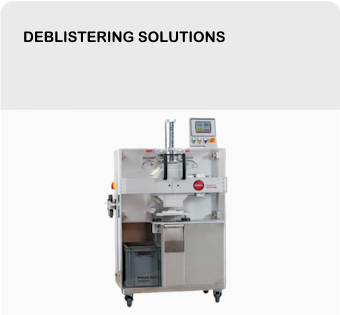Leak Testing Machines
Ensuring the integrity of pharmaceutical packaging is essential to protect drug stability, shelf life, and patient safety. Traditional leak testing methods like Blue Dye Methylene are often destructive, costly, and time-consuming.
Sepha has developed innovative, non-destructive leak testing solutions that offer a reliable, efficient alternative. These advanced systems allow manufacturers to test pharmaceutical packaging without damaging the product, reducing waste and enabling tested items to return to the production line.
Sepha’s leak testing machines are suitable for a wide range of packaging types, including:
- Blister packs
- Induction-sealed bottles
- Sachets and pouches
- Medical devices
Sepha’s deterministic, non-destructive methods provide accurate, repeatable results and help manufacturers save time, minimise recalls, lower costs, and improve sustainability.
Explore Sepha’s leak testing solutions to see how they can enhance your packaging quality and streamline your production process.
The Sepha MediScan is a package leak test device developed to leak test flexible packaging. The machine is a tool-less, non-destructive leak detection device for non-porous pouches, sachets and medical device packaging.
- Pouches
- Sachets
- Medical device packaging
The machine incorporates leak detection technology and software, developed by Sepha, that is utilized on a daily basis by top global pharma companies to leak test flexible packaging and ensure product packaging integrity.
Features
-
- Non-destructive seal integrity and leak detection device
- No tooling required, making it highly flexible across several pack types and sizes
- Capable of detecting weak seals, channel leaks and holes down to 10μm (pack dependent)
- Table top device
- Capable of handling non-porous packages up to 100mm x 200mm x 250mm
- Easy operator use via touch screen interface and easy load chamber
- Capable of storing multiple test methods for up to 30,000 product types
- User defined password protection ensuring multiple operator use
- Fully validated system
- Production of objective and repeatable results
- Test results can be printed, exported via USB (x2) or integrated into local quality control system via Ethernet cable
- Fast, efficient test speed
- Audit data available and fully 21 CFR part 11 compliant.
- Active Directory and OPC connectivity available on request
Technical Specifications
Pack Types:
Suitable for sachets, pouches, bags, modified atmosphere packaging (MAPs), and flexible, non-porous packaging.
Test Area:
Supports packs up to 250mm (L) x 200mm (W) x 100mm (D).
Test Cycle:
Fast test cycles starting from 20 seconds per pack.
Operation:
Semi-automatic for easy and efficient use.
Construction:
Durable 304 stainless steel casing for long-lasting performance.
User Interface:
10″ HDMI (800×480) LCD display for simple, user-friendly control.
Utilities Required:
- Power: 110/230V Single Phase AC, 50/60 Hz
- Air: Minimum 200L/min at 0.6Mpa (ISO8573-1:2010 CLASS 2)
Connectivity:
Includes 2 USB ports and 1 Ethernet port for easy data access.
Tooling Changeover:
No tooling required for quick and hassle-free changeovers.
Machine Size:
400mm (L) x 700mm (W) x 500mm (H)
Machine Weight:
90 kg (Shipping Weight: 190 kg)
Warranty:
Supplied with a 12-month warranty. Extended warranty options available for additional support.
Benefits
Reduce Waste and Maximise Product Yield
Sepha’s non-destructive, non-contact leak testing keeps both the product and packaging intact. Unlike traditional methods like the Methylene Blue Dye Test, this clean and dry process allows:
- Tested products to be safely retrieved from faulty packs and repackaged
- Passing packs to return to the production line, reducing waste and improving overall yield
Accurate and Reliable Results
- Detects leaks as small as 10 microns
- Stores product-specific data automatically for easy tracking
- Verifies each product before testing for added accuracy
- Fully objective results with no operator input required
- Pass/fail limits can match existing Blue Dye Test specifications
- Test data can be easily printed or exported for further analysis
Faster Troubleshooting and Better Production Efficiency
- Quick test cycles allow more frequent leak checks
- Early leak detection helps line operators address issues sooner, reducing the number of faulty packs produced
- Supports faster line set-up with fewer rejects
Simple and Easy to Use
- No special training needed
- User-friendly touch screen interface
- Instant product changeovers for seamless operation
Sepha’s leak testing solutions help manufacturers save time, reduce waste, and improve product quality with proven, non-destructive technology.
Force Decay Leak Test Method
Force Decay Leak Testing is a non-destructive method used to detect leaks or weak seals in non-porous, flexible packaging. It provides deterministic, quantitative, and repeatable results, making it a trusted choice for the pharmaceutical, medical device, and food industries.
How Force Decay Works
In this process, the flexible package is placed inside a vacuum test chamber equipped with a strain gauge load cell.
When vacuum is applied, the package expands, creating an outward force. The load cell measures this force over time to determine whether the package is intact or leaking.
- No Leak: The package expands and maintains a steady force reading.
- Micron Leak: The package initially expands but gradually loses force as air escapes.
- Gross Leak: No force is detected because the package cannot expand under vacuum.
To protect the package and prevent over-expansion, a restraining plate is used during the test.
Ideal Packaging for Force Decay Testing
Force Decay testing is perfect for flexible packaging containing solid or dry products.
It is widely used to test:
- Pouches
- Sachets
- Bags
- Stick packs
- Lidded trays
Packages made from foils, films, or laminates are best suited for this method due to their flexible nature.
Force Decay testing offers a clean, fast, and reliable solution to verify packaging integrity without damaging the product—helping manufacturers reduce waste and ensure quality with confidence.
The Sepha Multi-Q is a compact, lab-scale Container Closure Integrity Testing (CCIT) system designed to detect leaks in non-porous, rigid, and flexible packaging. It offers a non-destructive, deterministic, and multi-functional testing solution with quick, reliable results.
The Multi-Q is built for convenience with interchangeable tooling and multiple test methods, including vacuum decay and pressure decay.
Tooling can be changed quickly, and the system automatically loads the correct settings, enabling seamless, efficient testing.
The Sepha Multi-Q supports ASTM and USP 1207 guidelines, making it suitable for testing:
- Liquid and lyophilized vials
- Filled bottles
- Liquid-filled ampoules
- Pre-filled syringes
- Blow-Fill-Seal (BFS) containers
- Medical devices and more
It is a trusted solution for pharmaceutical and medical device manufacturers aiming to ensure quality, safety, and regulatory compliance.
Compatible Leak Testing Methods
A. Vacuum Decay
- Based on ASTM F2338-24
- Detects leaks and channel leaks as small as 5µm
- Quick pass/fail results in as little as 10 seconds
- Optional Multi-Q HD available for ultra-sensitive detection down to 1µm for parenteral applications
B. Pressure Decay
- Reliable and repeatable non-destructive testing
- Ideal for lyophilized and liquid-filled vials, ampoules, bottles, and more
- Detects leaks as small as 5µm with fast results in around 10 seconds
C. Flexible Membrane Leak Testing
- Non-destructive and tool-free
- Ideal for flexible packaging like pouches, sachets, and bags
- Uses hybrid membrane technology to test for gross and micron leaks
- Suitable for packaging that contains tablets, capsules, powders, or devices
D. Pressure Decay Bag Tester
- Specially designed for empty bag testing including IV bags, blood bags, and catheters
- Detects both gross and micron leaks with quick, accurate results
Additional Test Methods Available
- Ramp to Event: Destructive testing for detecting weak seals or welds
- Ramp to Proof Pressure: Non-destructive test to verify pressure thresholds
- Occlusion Testing: Non-destructive test to confirm components remain open as designed
Why Choose the Sepha Multi-Q?
- Non-destructive testing saves product and reduces waste
- Reliable, repeatable, and quick results
- Supports multiple packaging types and flexible product changeovers
- Compact and easy-to-use design
The Sepha Multi-Q is a smart, efficient, and cost-effective solution for enhancing leak detection and quality assurance in pharmaceutical and medical device packaging.
The Sepha Multi-Q HD is a highly sensitive, non-destructive Container Closure Integrity Testing (CCIT) system designed to detect leaks as small as 1 micron in parenteral containers.
Parenteral products, which are injected directly into the body, require the highest packaging standards. Even the smallest defect can compromise sterility, shelf life, and patient safety. These applications often have a lower Maximum Allowable Leakage Limit (MALL) and demand ultra-sensitive leak detection.
The Sepha Multi-Q HD meets this need by providing reliable, non-destructive testing that can identify micron-sized defects quickly and accurately.
The Multi-Q HD uses vacuum decay technology in line with the ASTM F2338-24 standard, the FDA’s preferred method for non-destructive leak testing. It also fully complies with USP 1207 guidelines, which recommend deterministic and objective testing methods.
- Detects leaks as small as 1 micron (depending on container type and content)
- Uses advanced sensors with an improved signal-to-noise ratio for faster, more accurate readings
- Offers quick, reliable, and repeatable pass/fail results
The Multi-Q HD is compatible with interchangeable attachments and can also support:
- Pressure Decay: Ideal for testing containers with oil-based liquids, toxic products, glucose/protein, powders, or other contents that are not suitable for vacuum testing.
- Flexible Membrane Testing: Designed for pouches, sachets, and flexible packaging, this method uses a hybrid membrane and vacuum decay to detect leaks and weak seals down to 5 microns.
Key Benefits
- Non-destructive and deterministic leak testing
- Ultra-sensitive detection for critical parenteral packaging
- Fast, repeatable, and easy-to-use system
- Supports multiple container types and flexible product changeovers
- Designed to improve quality control, reduce waste, and ensure patient safety
The Sepha Multi-Q HD is a smart, reliable solution for pharmaceutical manufacturers who need precision and confidence in their leak testing processes.
Key Features
- Non-Destructive and Deterministic
Delivers accurate, repeatable, and reliable leak testing without damaging the product or packaging. - Ultra-Sensitive Detection
Capable of identifying leaks as small as 1 micron (depending on container type and contents). - Versatile Application
Perfect for testing vials, ampoules, bottles, pre-filled syringes, and BFS strips containing water-based liquids. - Unlimited Data Storage
Automatically stores all test data for easy tracking and compliance. - Industry-Approved Method
Uses the ASTM F2338-24 standard and meets the guidelines of USP 1207 for non-destructive leak testing. - Compliance Ready
Fully compliant with 21 CFR Part 11 for electronic records and signatures. - Seamless Integration
Supports OPC connectivity and Active Directory for smooth system integration and secure user management.
Technical Specifications
Suitable Container Types
- Ampoules
- Vials
- Pre-filled syringes
- Bottles
- Blow-fill-seal (BFS) strips
- Medical devices
Measurement Sensitivity
- Detects leaks as small as 1 micron*
(*Dependent on container type and contents)
Test Cycle Time
- Fast testing starting from 10 seconds per cycle
Operation
- Fixed tooling easily attaches to the top of the unit or via the test port for flexible setup
Data Storage
- Unlimited storage capacity for easy record-keeping and traceability
Compliance
- Uses the ASTM F2338-24 standard
- Compatible with USP 1207 guidelines
Machine Dimensions
- 377mm (L) x 366mm (W) x 288mm (H)
- Compact footprint suitable for lab-scale operations
User Interface
- 10.1” PCAP touchscreen for intuitive and easy operation
Connectivity
- Active Directory integration
- Network printing and central storage
- Custom MES/OPC data connectors available
Utilities
- Electrical: 24V, 5A
- Air Supply: Minimum 200L/min at 0.6 MPa (ISO8573-1:2010 Class 2) or compatible with a vacuum pump
Additional Features
- Customizable flexible reports
- 3 x USB ports
- 2 x Ethernet ports
- External calibrated leak port for added accuracy
Vacuum Decay Leak Test
The Vacuum Decay Leak Test is a non-destructive, reliable method used to detect leaks in packaging and ensure Container Closure Integrity (CCI). It is widely used in the pharmaceutical, medical device, and food industries to identify both gross defects and tiny micron leaks.
This method follows the ASTM F2338-24 standard and is a FDA-recognized consensus for non-destructive leak detection.
How Vacuum Decay Testing Works
A container is placed inside a tightly sealed test chamber. The air inside the chamber is evacuated to create a vacuum. Once the target vacuum level is reached, the system monitors the pressure over a set period.
- If there’s a leak: Pressure will rise inside the chamber.
- Types of leaks detected:
- Gross Leak: The vacuum doesn’t reach the required level.
- Medium Leak: The vacuum drops below the set level during the test.
- Micron Leak: The vacuum level decays slightly but exceeds the allowable limit over time.
The test is fast, accurate, and non-destructive, making it ideal for frequent quality control.
Packaging Suitable for Vacuum Decay Testing
Vacuum decay can test a wide range of non-porous, flexible, semi-rigid, and rigid containers.
Examples include:
- Plastic bottles (screw-capped) with liquids, tablets, capsules, or powders
- Glass or plastic vials with liquids or powders
- Glass or plastic ampoules
- Pre-filled syringes (glass or plastic)
- Ophthalmic dropper bottles
- Blow Fill Seal (BFS) bottles and strips
- Flexible pouches and bags containing solids or medical devices
- Sealed trays or cups with tablets, capsules, powders, or devices
- Non-lidded trays or cups (can be tested when blocked or masked to create a sealed test space)
The vacuum decay test can detect holes as small as 5 microns in flexible packages.
Why Choose Vacuum Decay Testing?
- Non-destructive: Tested packages remain intact and reusable.
- Accurate & repeatable: Provides consistent results.
- Regulatory approved: Complies with ASTM F2338-24 and FDA guidelines.
- Wide application: Suitable for many packaging types across pharmaceutical, medical, and food industries.
Vacuum decay testing offers a clean, efficient, and proven solution for maintaining packaging integrity and ensuring product safety.
The Sepha PakScan is a non-destructive, multi-product seal integrity tester designed for modern manufacturers and packaging companies. It uses force decay technology to quickly and accurately verify the integrity of non-porous flexible packaging.
PakScan provides a clean, dry, and non-destructive leak test solution ideal for products packed in pouches, sachets, bags, and stick packs containing dry powders, solid components, or medical devices. Tested packs that pass can be safely returned to the production line, helping manufacturers reduce waste and increase product yield.
Fast & Reliable Testing
- Tests up to 10 packs at once
- Delivers results in just 30 seconds
- Detects leaks, gross holes, and weak seals as small as 10μm*
(*Leak detection capability depends on the packaging material and pack size.)
The system offers deterministic and objective pass/fail results for each individual pack, displayed clearly on the result screen. The software is designed to meet FDA 21 CFR Part 11 requirements, ensuring secure data storage, traceability, and audit-ready reports.
PakScan is suitable for flexible, non-porous packaging materials such as:
- PVC
- PVDC
- Aclar
- Aluminium foils and laminates
Available Configurations
The Sepha PakScan comes in standard configurations for testing 3, 4, 5, 6, 8, or 10 packs simultaneously and can also be customised for larger packaging.
| Configuration | Pack Length | Pack Width | Pack Thickness |
| 3 Packs | 270 mm | 155 mm | 45 mm |
| 4 Packs | 270 mm | 95 mm | 45 mm |
| 5 Packs | 270 mm | 95 mm | 45 mm |
| 6 Packs | 130 mm | 155 mm | 45 mm |
| 8 Packs | 130 mm | 95 mm | 45 mm |
| 10 Packs | 130 mm | 95 mm | 45 mm |
The Sepha PakScan is a smart, sustainable solution for manufacturers who want to protect product quality, minimise waste, and streamline their packaging integrity checks.
Key Features
- Non-destructive testing helps reduce waste and allows tested packs to return to the production line.
- Tests up to 10 packs at once with standard options for 3, 4, 5, 6, 8, or 10 pack configurations.
- Ideal for dry, non-porous packages like pouches, sachets, bags, and stick packs.
- User-friendly system with password protection to support multi-operator use.
- Consistent, reliable results with a repeatable, deterministic pass/fail outcome.
- Easy to validate and simple to operate.
- Test results can be printed, exported via USB, or easily connected to local quality systems using Ethernet.
- Active Directory and OPC connectivity available upon request.
- Fully compliant with FDA 21 CFR Part 11 for secure, audit-ready data handling.
Technical Specifications
Pack Types:
- Sachets, pouches, bags, and MAP made from flexible, non-porous materials.
Pack Sizes:
- Refer to the pack size table in the Features section.
Key Specifications:
- Test Cycle Time: Starts from 20 seconds per cycle.
- Leak Detection Range: Detects holes as small as 10 microns (depending on pack and material).
- Operation: Semi-automatic system for efficient testing.
- Construction: Durable 304 stainless steel workstation with anodized aluminium test area. All product contact parts are cGMP compliant.
- Utilities:
- Electrical: 110/230V Single Phase AC, 50/60Hz
- Air: Minimum 200L/min at 0.6Mpa (ISO8573-1:2010 CLASS 2)
- Configuration Options:
- 2x USB ports
- 1x Ethernet port
- User Interface:
- 12.1-inch HDMI resistive touchscreen (1280 x 800 resolution) for easy operation.
- Tooling Changeover: Quick changeover in approximately 1 minute.
- Audit Compliance:
- Fully compliant with 21 CFR Part 11 for secure data management.
- Machine Dimensions:
- Without screen: 670mm (L) x 760mm (W) x 882mm (H)
- With screen: 670mm (L) x 1042mm (W) x 1195mm (H)
- Machine Weight: 200 kg
- Shipping Weight: 260 kg
- Warranty: 12-month standard warranty with extended options available.
Applications
Drug Stability Testing in Laboratories
Sepha’s leak testing systems support research and development teams in testing materials to ensure new products are properly protected from moisture, air, and bacterial contamination. This helps verify that the right packaging materials are used to maintain product stability.
Quality Assurance in Packaging
Sepha’s technology can be easily integrated into Quality Assurance procedures to routinely test packaging integrity. Objective, non-destructive leak testing provides reliable verification of seal quality and ensures the packaging process consistently meets the highest standards.
Minimise Production Waste
By performing leak testing more frequently, pharmaceutical manufacturers can quickly detect leaks and resolve issues early. This reduces production rejects, lowers waste disposal costs, and helps prevent large volumes of faulty packages from reaching the next stage of production.
Benefits
Non-Destructive Testing
Sepha PakScan offers a clean, dry, and non-contact leak testing solution that reduces waste and maximizes product yield. Unlike traditional destructive methods like the Methylene Blue Dye Test, this system keeps both the product and packaging intact. Packs that pass can go straight back onto the production line, while products from faulty packs can be recovered and repackaged.
Reliable and Accurate Results
PakScan can detect holes as small as 10 microns and automatically saves product-specific test data. Each cycle begins with product verification to ensure accuracy. Results are fully objective, requiring no operator input, and pass/fail criteria can match the sensitivity of existing dye tests. All data can be printed or exported for detailed analysis.
Faster Troubleshooting
With a quick test cycle, PakScan allows more frequent leak checks. Early detection of leaks helps line operators quickly pinpoint issues and minimize production waste.
Simple and User-Friendly
Designed for easy operation, PakScan features a touch-screen interface and requires no special technical skills. Product changeovers take just one minute, making it a practical choice for fast-paced production environments.
Force Decay Leak Test Method
Force Decay Leak Testing is a non-destructive method used to detect leaks or weak seals in non-porous, flexible packaging. It provides deterministic, quantitative, and repeatable results, making it a trusted choice for the pharmaceutical, medical device, and food industries.
How Force Decay Works
In this process, the flexible package is placed inside a vacuum test chamber equipped with a strain gauge load cell.
When vacuum is applied, the package expands, creating an outward force. The load cell measures this force over time to determine whether the package is intact or leaking.
- No Leak: The package expands and maintains a steady force reading.
- Micron Leak: The package initially expands but gradually loses force as air escapes.
- Gross Leak: No force is detected because the package cannot expand under vacuum.
To protect the package and prevent over-expansion, a restraining plate is used during the test.
Ideal Packaging for Force Decay Testing
Force Decay testing is perfect for flexible packaging containing solid or dry products.
It is widely used to test:
- Pouches
- Sachets
- Bags
- Stick packs
- Lidded trays
Packages made from foils, films, or laminates are best suited for this method due to their flexible nature.
Force Decay testing offers a clean, fast, and reliable solution to verify packaging integrity without damaging the product—helping manufacturers reduce waste and ensure quality with confidence.
The Sepha VisionScan 3D is an innovative blister leak testing solution that brings non-destructive testing to the next level. Using advanced 3D measurement technology combined with differential pressure and vacuum, the system can detect leaks as small as 5μm (pack and material dependent) in individual blister pockets.
Key Advantages:
- Accurate Across All Foil Types: Whether matte or gloss, the VisionScan 3D easily adapts to different materials and text patterns, making it perfect for production lines with multiple language variations.
- Tool-Free Operation: With no tooling required and a large test area of 297 x 210 mm, the system can test multiple blister packs at once, saving time and increasing efficiency.
- Simple Calibration & Quick Setup: Designed for easy calibration and fast changeovers, it’s ideal for operations with frequent product switches.
- Non-Destructive Testing: The packs remain fully intact and can return directly to the production line if they pass the test, reducing waste and saving costs.
The VisionScan 3D uses the vacuum deflection principle following ASTM F3169-16 (2024) standards. It builds on trusted methods used in previous Sepha models while introducing advanced 3D sensing for faster, more reliable results.
The Sepha VisionScan 3D is a flexible, reliable, and cost-effective alternative to destructive leak testing—helping pharmaceutical manufacturers streamline quality control without compromising product integrity.
Key Features
- Non-Destructive Blister Leak Testing: Quickly and safely tests blister packs without damaging the product or packaging.
- Highly Accurate Detection: Identifies leaks, weak seals, and channel leaks as small as 5μm (pack and material dependent) using vacuum deflection technology in line with ASTM F3169-16 (2024) standards.
- No Tooling Required: Perfect for production lines with frequent product changes.
- High Throughput: Large test area (297 x 210 mm) allows multiple blister packs to be tested at once, improving productivity.
- Versatile Testing: Suitable for blister packs containing tablets or capsules in a variety of formats and materials.
- Fast Test Cycles: Delivers reliable results in as little as 60 seconds for micron holes and 30 seconds for gross holes.
- Easy to Operate: Simple, user-friendly touch screen interface.
- Unlimited Product Storage: Easily manage multiple product types within the system.
- Seamless Connectivity: Supports network integration, Active Directory access, and data export for quality audits.
- 21 CFR Part 11 Ready: Can be part of a compliant system with secure data handling and flexible reporting.
The VisionScan 3D offers pharmaceutical manufacturers a smart, efficient, and cost-saving solution for blister leak testing—ensuring high product integrity with every batch.
Technical Specifications
- Pack Type:
Blister Packs - Test Area:
297 mm x 210 mm - Detection Range:
Capable of detecting leaks as small as 5μm (depending on pack and material). - Test Cycle Time:
From 30 seconds for gross leaks and 60 seconds for micron leak detection. - Operation:
Semi-automatic for ease of use. - Construction:
Durable anodised aluminium with acrylic and polyurethane casing. - Power & Air Requirements:
240–100V AC, Single Phase, 220W
Compressed Air: Minimum 200L/min at 0.6 MPa [ISO8573-1:2010 CLASS 2] - Connectivity:
4 x USB ports, 1 x Ethernet port - Tooling:
Tool-less design for quick product changeover. - Compliance:
Can be operated as part of a 21 CFR Part 11 compliant system. - Machine Dimensions:
691 mm (L) x 489 mm (W) x 701 mm (H) - Weight:
Machine: 68 kg
Shipping Weight: 110 kg - Warranty:
Supplied with a 12-month warranty (Extended warranty options available).
Applications
Drug Stability Testing in Labs
R&D teams use VisionScan 3D to ensure packaging materials effectively protect products from moisture, air, and bacteria—helping maintain drug stability.
Quality Assurance for Packaging
Integrate leak testing into your QA process to guarantee blister pack integrity. VisionScan 3D provides accurate, objective seal testing to maintain compliance and quickly identify any unusual results.
Reduce Production Waste
Catch leaks early with frequent testing to lower the number of rejected blister packs and reduce waste. This helps operators address issues faster, preventing large batches of faulty products
Benefits
- Non-Destructive Testing
This clean, dry test method avoids damaging products or packaging, unlike traditional destructive tests like the Methylene Blue Dye Test. Products that pass can be returned to the production line, while those from faulty packs can be recovered and repackaged. - Tool-Free, Flexible Testing
No tooling is needed, so multiple pack formats can be tested quickly and easily. - Accurate and Reliable Results
Detects tiny leaks as small as 5μm* with objective pass/fail outcomes—no operator bias involved. Results are stored securely and can be printed or exported for further review.
*Dependent on pack type and material. - Faster Issue Detection and Reduced Waste
Quick test cycles allow for more frequent leak checks, helping operators identify and fix problems sooner—resulting in fewer rejected packs and less waste. - Fast Return on Investment
Users typically see a return on investment within a year by switching from dye-based tests to VisionScan 3D. - User-Friendly Interface
Designed for ease of use, no special technical skills are needed. The touch screen makes operation simple and intuitive.
Vacuum Deflection Leak Testing
Vacuum deflection is a non-destructive, precise method to check the integrity of pharmaceutical blister packs—those with a rigid base and flexible lidding foil, often containing multiple cavities or pockets.
This test is commonly used during production and stability testing to ensure faulty packs don’t affect product quality. Vacuum deflection with laser measurement follows the ASTM F3169-16 (2024) standard, recognized for reliable blister leak detection.
How It Works
The blister pack is placed inside a vacuum chamber and scanned by a laser to capture its surface profile. When vacuum is applied, the foil on each blister pocket expands if there are no leaks. The system measures the change in height (deflection) of the foil compared to its original shape.
- If there is a large hole, the foil won’t move because the pressure inside the pocket equals the vacuum pressure.
- If no holes exist, the foil moves noticeably under vacuum.
- Small holes cause the foil to expand initially but then slowly collapse as air escapes—this collapse helps detect tiny defects.
What Can Be Tested?
Vacuum deflection is ideal for non-porous blister packs sealed with flexible lidding materials like polymer, foil, or paper. These packs typically hold tablets or capsules in individual pockets formed by polymer or aluminum trays.
This method is clean, fast, and non-destructive—offering a reliable alternative to traditional blue dye testing. Depending on the pack design and material, it can detect leaks as small as 5 to 50 microns.

